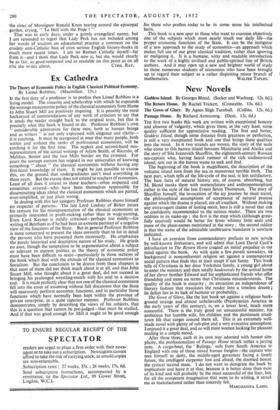New Novels
THE first two books this week are written with exceptional honesty and absence of vulgarity, which gives them, at the very least, some quality sufficient for appreciative reading. The first and better, Goddess Island, though some distance from greatness or perfection, is still a very exceptional book and one that brings these qualities into the mind. In it two strands are woven, the story of the seals who come to this barren island between Manchuria and Alaska and the story of Sila Ivanovich Shayffrin, the eighteenth-century Russian sea-captain who, having heard rumour of the rich undiscovered island, sets out in the barren waste to seek and find.
The beginning of the book is magnificent, the description of the volcanic island torn from the sea in monstrous terrible birth. The next part, which tells of the life-cycle of the seal, is less satisfactory. The bare facts of natural history are, of course, absorbing, but M. Blond masks them with nomenclature and anthropomorphism rather in the style of the late Ernest Seton Thompson. The story of Shayffrin himself, the invocation of the icy journey he must travel, the philosophical assumptions of acceptance of natural process against which the drama is played, are all excellent. Without making any extravagant claims of lasting merit, here is still a novel that can be confidently recommended to the serious reader. There are two oddities in its make-up : the first is the map which (although grate- fully received) would be better for fewer whimsy little seals and more of the place-names mentioned in the story ; the second oddity is that the name of the admirable unobtrusive translator is nowhere indicated.
I have an aversion from commendatory prefaces to new novels by well-known litterateurs, and will admit that Lord David Cecil's introduction to The Return Home created an initial prejudice in my mind against the book. As with quite a few ,novels nowadays, its background is nonconformist religion set against a contemporary social pattern that finds this at least unapt if not funny. This book tells of Christiana in her dour Yorkshire family, a young girl about to enter the ministry and then totally bouleversie by the arrival home of her clever brother Edward and his sophisticated friends who offer friendship and more on terms that Christiana misunderstands. The quality of the book is sincerity ; its attraction an independence of literary fashion that translates the reader into a timeless dream ; its defect lies in its lack of humour or probability.
The Gown of Glory, like the last book set against a religious back- ground strange and almost unbelievable (Presbyterian America in the early years of this century), is, on a lower level, much more successful. There is the truly good yet unsuccessful minister, his ambitious but humble wife, his children and the passionate small- town life that surges around them all. This is an extremely well- made novel with plenty of sub-plot and a very evocative atmosphere. I enjoyed it a great deal, and so will most women looking for pleasant reading in a simple mood.
After these three, each in its own way adorned with honest sim- plicity, the professionalism of Passage Home struck rather a jarring note. A cargo-boat, the Bulinga,' sails from South America to England with one of those mixed human freights—the captain who sees himself as deity, the middle-aged governess facing a lonely future, the intelligent carpenter lost and afraid, the doomed bosun, the cynical second mate. I do not, want to denigrate the book by implication and leave it at that, becUuse it is better done than most of its kind and will probably be the most successful of the four, but, for all the competent imagination that went to its writing, it struck me as manufactured rather than sincerely felt.
MARGHANITA LASKI.


































 Previous page
Previous page